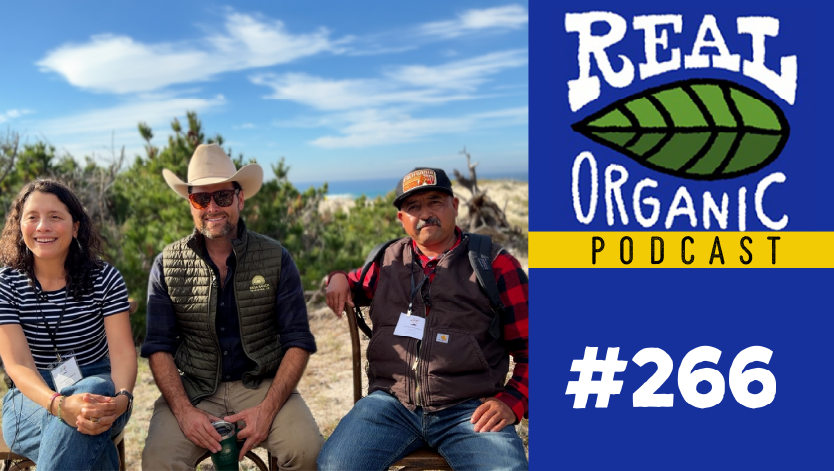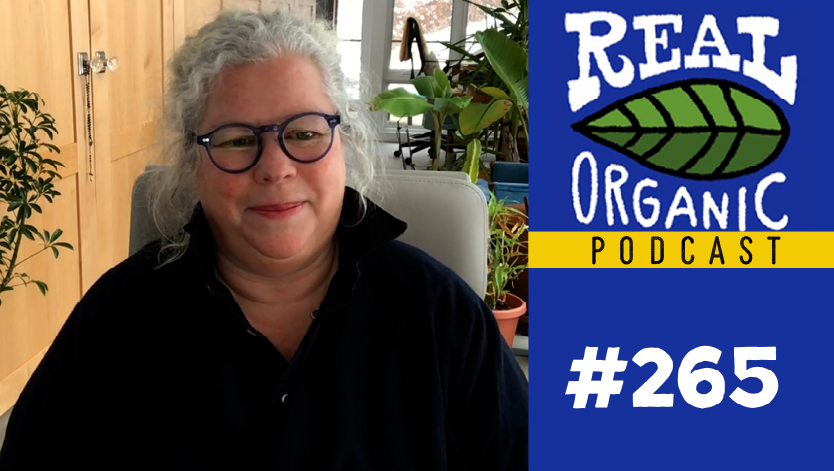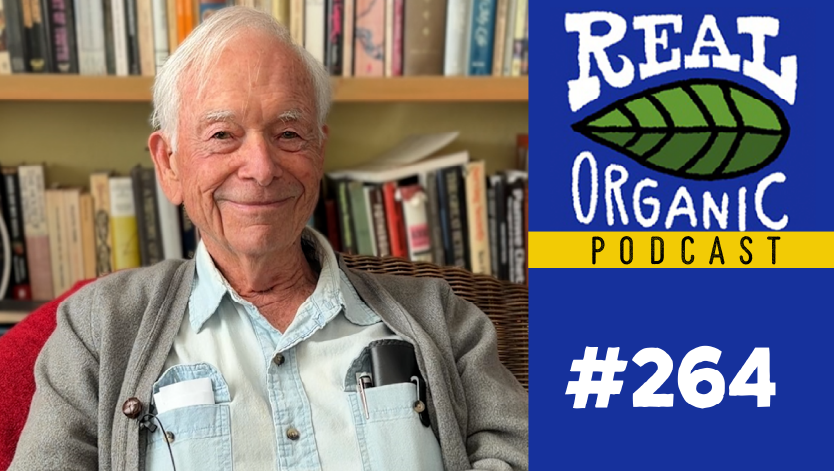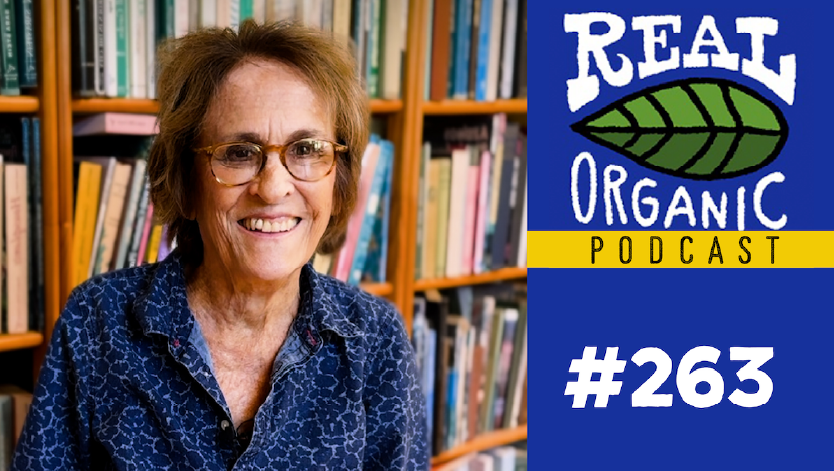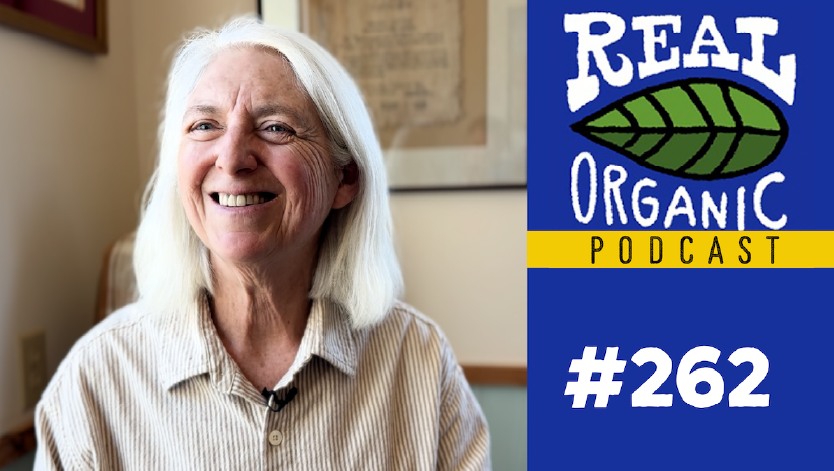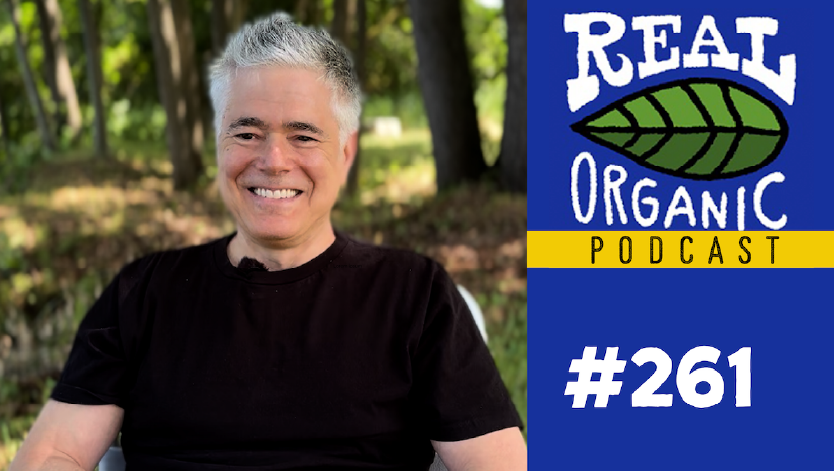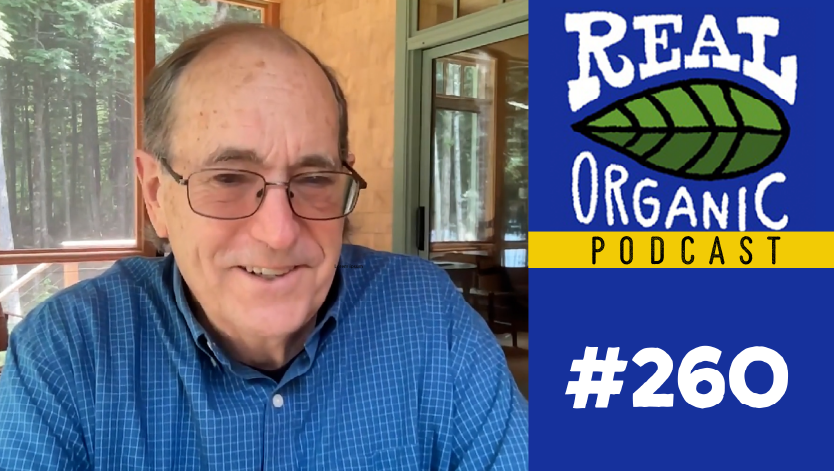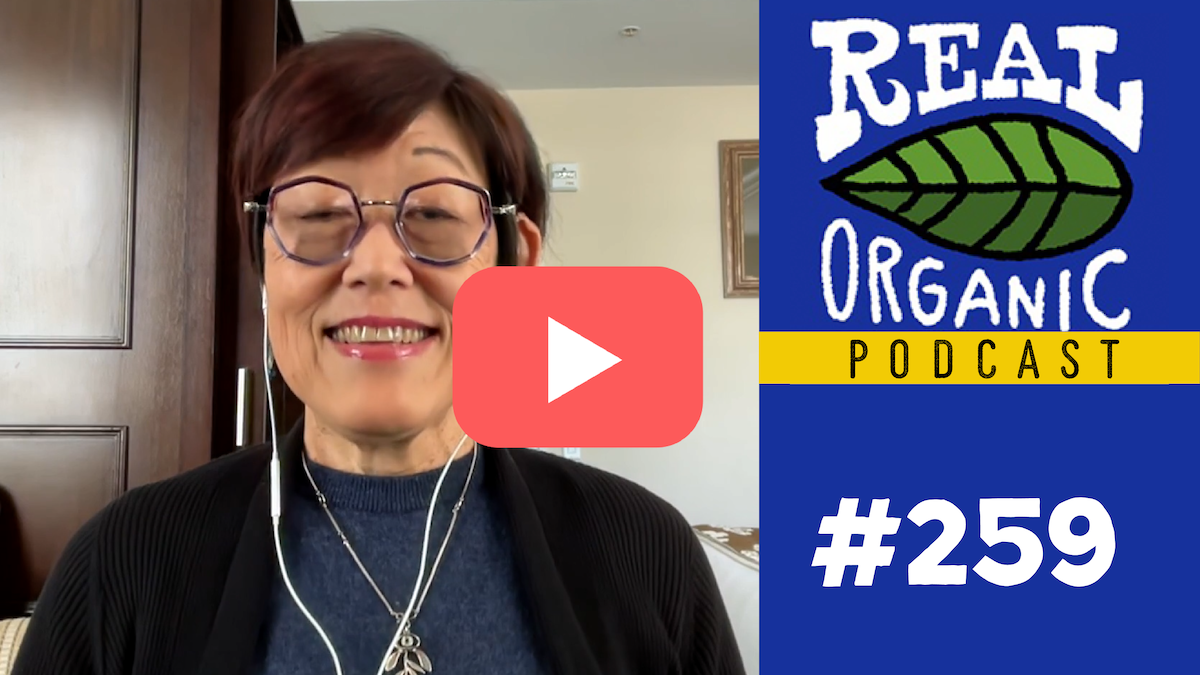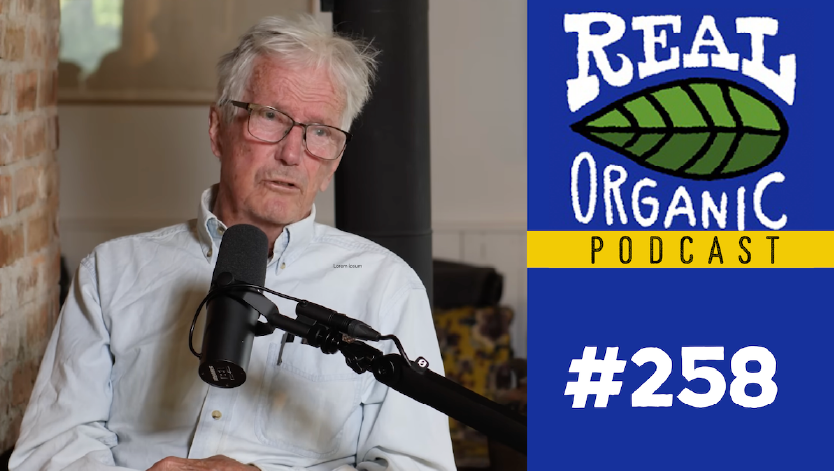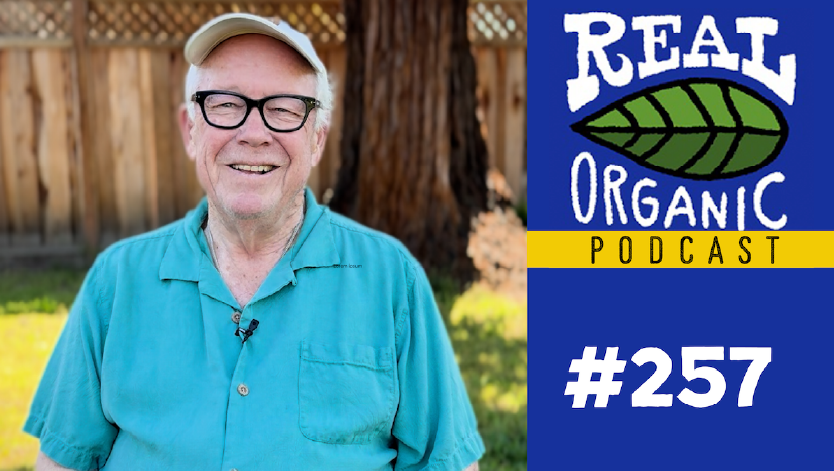Episode #210
Chuck Benbrook: What Monsanto Knew About Glyphosate
Suing Monsanto Over Glyphosate
Host Dave Chapman speaks with agricultural economist Chuck Benbrook about the Monsanto glyphosate lawsuit and its far-reaching implications. Benbrook, a key expert witness in the case, details how Monsanto misled regulators and the public about the cancer risks associated with glyphosate, the active ingredient in Roundup. He explains the mounting scientific evidence linking glyphosate to non-Hodgkin lymphoma and how juries have responded with massive verdicts against the agrochemical giant. With decades of experience analyzing pesticide regulation, Benbrook provides a deep dive into the legal battles, corporate cover-ups, and what it all means for public health and the future of food safety.
Our Chuck Benbrook interview has been edited and condensed for clarity:
You can subscribe and download episodes of our show through your favorite podcast app, our YouTube channel, or stream the audio-only version here:
Dave Chapman interviews Chuck Benbrook, Fall 2024
(You can read a 3-part series written by Chuck about what creates a lack of demand in organic fruit here.)
Dave Chapman 0:00
Welcome to The Real Organic Podcast. I’m talking today to Chuck Benbrook. Chuck, I’m looking forward to this. This will be a little more of a conversation than a formal interview, which is why we got connected. I want to learn what you’re doing; what you’re up to and what your thoughts are. I just saw you. Last week, I finished watching, “Organic Rising,” which is, I thought, a fantastic film.
Chuck Benbrook 0:27
I still haven’t seen it.
Dave Chapman 0:28
Yeah, that’s great. Well, Anthony did a very good job with it, and I was really impressed. It’s got a lot of people I’ve interviewed in it, and then some I haven’t that I ought to. He really takes a very beautiful overview at organic from a big perspective. You’re very good in it. You’re very good.
Chuck Benbrook 0:56
I think that interview might have been recorded a decade ago. Several years anyway.
Dave Chapman 1:03
Yeah. He said he finished filming it in 2018, and he’s been editing it together ever since.
Chuck Benbrook 1:15
I guess filmmakers and farmers share a trait that perseverance furthers.
Dave Chapman 1:22
Now, just as a farmer, he has the challenge of selling his crop. [inaudible 0:01:28] see the movie is not easy.
Chuck Benbrook 1:34
Well, the coverage and portrayal of organic and film is kind of a lively topic now. We’ve had, “Kiss the Ground,” “Common Ground,” “Organic Rising,” and I’m sure I’m forgetting another one. I guess we’re all hoping that one of these films really breaks into the general population.
Dave Chapman 2:06
Yeah. Well, it’s interesting, because I don’t think, “Kiss the Ground,” “Common Ground” mentions the word ‘organic.’
Chuck Benbrook 2:14
“Kiss the Ground” does a couple times, but “Common Ground” was when there was some change in the ideology of the filmmaking crew and or the financers of the film. Any mention of organic apparently, was systematically purged in the final cut of the film. It’s surprising to me that in none of the interviews that made it onto the film that the word ‘organic’ wasn’t used. I must have used it 20 times in the interview. I thought it was well done. I didn’t understand the degree to which the producers and the sponsors of the film had decided to disparage organic as a way to promote regenerative agriculture and the new regenified label, but that has become clearer today.
Dave Chapman 3:34
That’s one of the things I actually wanted to talk to you about. I know that you’ve been really pondering the rise of regenerative agriculture as a brand. I wouldn’t call it a movement. I’d call it a brand that’s being developed. What are your thoughts about that? We’ve seen some extremely well-meaning people who have done a lot of work to try and bring conventional chemical agriculture towards organic and without apparently wanting to mention the word. I’m just curious. I know that at this point that…well, I’d like to hear your thoughts.
Chuck Benbrook 4:16
I wish I was in my other office, because one of my most cherished mementos of my long career came from a dear friend of mine named Len Richardson, who was the editor of California Farmer and Agrochemical Age back in the 80s. He did my absolute favorite cover for an Ag industry magazine. The cover story was on, Low Input Sustainable Agriculture (LISA). It was a cartoon caricature of a guy driving a manure spreader, big rig, and out on the boom there was a Holstein cow sitting on it, holding on for dear life as it went through the field. It’s so classic.
Chuck Benbrook 5:17
Going back all the way into the 80s, there was a general understanding that organic would be a heavy lift for a lot of farmers. Particularly large-scale, row crop farmers that had already bought into, at the time, large-scale equipment. It wasn’t an easy thing for them to diversify their rotations and get some pasture and some animals back into the system. So, even back in the 80s, those of us who were promoting diversification of approaches to growing food, recognized there needed to be something between organic and conventional agriculture, a way station.
Chuck Benbrook 6:07
I think as is clear now, we need that way station for a couple reasons. One is to give large-scale conventional farmers a goal and some economic reward for changing their systems in a way, for example, that improves soil health and captures more carbon in the soil or helps protect water quality in their area. A lot of those farmers, they’re not going to go the rest of the way to organic but still having a place for them to go, to get them off of the conventional chemical treadmill that so many of them are on, is a good thing.
Chuck Benbrook 6:50
Now, we all also recognize the need for something between conventional and organic, so that farmers in organic transition can get paid at least some premium in the three years of the transition. Which for certainly my whole career, the cost of going through the transition in the absence of a premium has been one of the major roadblocks for the transition to organic
Chuck Benbrook 7:20
So, there’s a need for these alternative labels, whether you’re going all the way to organic or not. Just during my career, we’ve had LISA (Low Input Sustainable Agriculture), sustainable agriculture, obviously organic agriculture. Now we’re talking about regenerative agriculture, and sometimes regenerative organic mixed together.
Chuck Benbrook 7:54
So, obviously, the community hasn’t coalesced around a set of terms and concepts. There’s a sort of a constant shuffling to come up with the new thing that will capture the minds and hearts of both marketers and consumers. For a while, of course, it was the Non-GMO Project and the Non-GMO label, which, as you know, Dave, some of the prominent, widely respected leaders in the organic community, were behind the beginning of the Non-GMO Project.
Chuck Benbrook 8:38
They felt it was a necessary evil to get serious about backing up the Non-GMO claim in organic. What a great example of law of unintended consequences? The Non-GMO label took off, the people that controlled it, really moved on to other goals other than protecting the validity of the Non-GMO claim in organic and marketed it widely in the food industry. Now, we’ve got non-GMO orange juice when there’s no genetically engineered oranges on the market.
Chuck Benbrook 8:38
Right. Non-GMO water.
Chuck Benbrook 9:18
Yeah. So, the short answer to your question is, yeah, there is a need and a legitimate role for these intermediate labels between conventional and organic, but the problem is the opportunity to take control of the substance and the content of these interim labels by commercial interests it’s very strong. When you have, take regenerative Ag today, there’s more money being spent on PR to promote the regenerative label than there isn’t research on sustainable and organic agriculture.
Chuck Benbrook 10:26
It’s just so regrettable that unfortunately these interim labels are so vulnerable to greenwashing and really corporate interests, food companies taking them over to serve their own needs, which is mostly to figure out a way to either make more money from what they have been doing, or give them cover so they don’t have to change. It’s one of those two things.
Chuck Benbrook 10:57
So, I think these alternative labels for the most part, have set back the effort to try to change the food system, because none of the alternative labels really put in the work and the credibility and the verification that the organic label does, and without that, they kind of become meaningless.
Dave Chapman 11:32
Yeah. Well, the thing I find most disturbing, Chuck, isn’t just that they’re meaningless, but they’re actually being weaponized against organic, and that is happening. I’ve seen from Regenified, the fundraising deck, and the second thing they have is basically an attack on organic. I hear it over and over, and I go, “God, what is going on here?” I understood from some of the people who are really pushing regenerative as a term and as a concept, I understood that they wanted to keep their distance from organic, because the farmers they were trying to sell this to didn’t like organic.
Dave Chapman 12:17
They were good old salt of the earth, Midwestern farmers, and they didn’t believe in this hippie stuff from the coasts. Okay, but that’s different from attacking organic. I think at this point, it’s not just a an empty threat, I think they’re quite effective. You go to talk to people in Congress, and they’re quite excited about regenerative, and they’re not very excited about organic.
Chuck Benbrook 12:42
Well, unfortunately, a lot of the problems with the organic community and the organic movement have been self-inflicted. I’ve been bemoaning this fact and trying to deal with it for my entire career. But, it’s very difficult to see how we’re going to pull out of the sort of the tail spin that we’re in. Now, in terms of “Kiss the Ground” and “Common Ground” with the focus on soil health and carbon sequestration and Climate Change, etc., it is definitely understandable that they wouldn’t want to transition to organic as, “That’s where everybody’s got to get to.”
Chuck Benbrook 13:48
You’re talking about 1% of the land in the Midwest and in row crop agriculture areas that are organic versus on the coast, it’s 10% or more. So, most farmers on the coast where there’s substantial organic acreage, they understand what is required to transition. Many of them are growing both organic and conventional crops, and for the most part, the major growth in the organic industry in the fruit and vegetable sectors of the food system are driven by a lack of demand and not the capacity to produce the food.
Chuck Benbrook 14:36
I’ve talked to innumerable scientists and farmers in the Pacific Northwest in fruit and vegetable country, and most of them say, “Oh, we could have been 80% organic by now if the market demand was there in the regions.” I think Washington state is close to 20% organic on tree fruit, which is, I think, the largest penetration in a major crop. But again, most of the people in the industry say, “There’s no reason why we couldn’t do it.” I think in Washington State, I think 90% or 95% organic in fruits and vegetables, it would be totally feasible, and the only reason the other 5% could make it, is that there’s some more difficult to resolve imbalance in soil nutrients and micronutrients, or pest problems. Something that is undermining the efficacy of the organic systems that are working really well throughout the state.
Dave Chapman 15:47
From my lowly seed in the bleachers here, I have seen a lot of well-established organic farms struggling in recent years in fruits and vegetables. I haven’t spent much time in Washington, but in California, this is certainly true. But I also see that 40% of the fruits and vegetables being imported from other places. I think that the reason that these farms are struggling is just price. The reason the price is so low is other places are paying very low labor costs, and fruit and vegetables have high labor.
Chuck Benbrook 16:30
Sure. Well, don’t forget, Dave, on fresh fruits and vegetables, seasonality has a huge impact on the global flow of food. Whether you and I think it’s a wise thing to put blueberries on an airplane from Chile to New York in the middle of the winter, there’s going to be a certain amount of high-quality fresh produce moving around the globe to meet fresh market demands in population centers. There’s a lot of fruit and vegetables that are coming in from Mexico. But, again, most of them in the winter, when you’re not growing tomatoes in Vermont or strawberries in Minnesota, during the winter months. So, there’s always going to be some imports.
Dave Chapman 17:29
Let me tell a story. One of my trips out there, I went to Mill Valley, and I went to the Whole Foods. I always go to Whole Foods all over the place, because it’s like my temperature, my thermometer to see what’s happening. This was in mid-August, height of tomato season. I just visited a farm that had some acres of tomatoes untouched. They were about to till under because they had no market. I went to the Whole Foods in Mill Valley, and the only certified organic tomatoes were from Mexico. I know the farm there, too. They’re hydroponic, certified as organic. I thought, “What is wrong with this picture?” It wasn’t just about seasonality; it was the height of tomato season.
Chuck Benbrook 18:15
Just the carbon cost of shipping the tomatoes from Mexico to the US, should give anybody a pause. I’m not saying that there isn’t crazy stuff going on. I’ve even seen blueberries from Chile in in foodie markets in Seattle in the middle of berry season. The greatest berry growing area in North America is in the Skagit Valley. There’s crazy stuff that goes on.
Chuck Benbrook 18:59
Alot of it is Whole Foods wants to have a business relationship with us this relatively small number of large players, and large players have farms in Mexico, and they have farms around Watsonville and in the Skagit Valley and in other places where they can grow particular crops year-round. So, the market has been squeezing out a lot of local production that could be riper and hence more nutrient dense and more flavorful. It’s really a shame.
Dave Chapman 19:42
Let me ask you something that you said. You said a lot of the problems that organic is facing are self-inflicted. I’m curious what you meant by that. You didn’t elaborate on that.
Chuck Benbrook 19:56
The organic community in terms of the rules and regulations and the important details of what is required to be an organic farmer and how the certification process works, etc., basically has changed very little for 25 years. It has proven to be exceedingly difficult to make any substantive changes in either the law or the regulation. The amount of time and effort required by the USDA, by allied industry organizations, growers, food companies, to go through the rule-making process for even fairly insignificant changes is just so out of proportion.
Chuck Benbrook 20:57
As a result, the organic farming and food community, organic retailing, all stages of the supply chain have not been able to innovate nearly to the degree that would be possible if people could come to consensus on some of the changes. The ongoing fight over the scale of organic farming, which…it’s so critical in the livestock sector – the livestock half of the play – but it’s also important on the plant side where scale issues are so important. Then in terms of crops, and especially fruits and vegetables, the high value crops, the hydroponic debate has just been a devastating setback for the community.
Chuck Benbrook 22:00
I think the wrong decisions have been made. It’s very difficult to explain them or defend them, and I think it’s one of the things that’s chipped away at the confidence and understanding that the consumer has in organic food.
Chuck Benbrook 22:20
Another thing I’ll say, and I feel very strongly about this, the US Department of Agriculture has basically sat on its hands, as the conventional food industry and mostly the fertilizer, pesticide, GMO part of the food industry, has invested heavily and continuously in a very well-orchestrated campaign to discount or undermine the clear environmental and human health benefits of organic food. It’s just been really sad to watch that unfold.
Chuck Benbrook 23:04
The difference in the consumer adoption and market demand for organic and in some of the European countries that have not had that at the institutional level, the USDA of Austria, the USDA of Switzerland, hasn’t gone out of its way to back up the Karl Winters and other people who’ve made a big part of their career, trying to undermine the USDA data, the published USDA research that shows clearly that organic food is better for you, nutritionally and in terms of pesticide residues at risk.
Chuck Benbrook 23:52
So, I hope that the day will come when new leadership comes into USDA, and it will have to be from the secretary’s office on down, and they fix a lot of these problems that are embedded in USDA policy. There’s a USDA policy on the books that says, “Okay. You could talk about some environmental benefits of organic, but USDA employees can’t say that organic food is healthier for you, because that hasn’t been proven.”
Chuck Benbrook 24:34
Well, that’s a really devastating problem for the organic community, because the USDA scientists that go out and do a comparative trial of organic tomatoes versus conventional tomatoes and find that the organic tomatoes are healthier, have essentially no pesticide residues, they can get away with getting a paper in a technical journal, as long as they just stick to the numbers and don’t use words like, “it’s healthier,” but it’s just not allowed.
Chuck Benbrook 25:13
That’s why some of the scientists have had to leave the USDA over the last 20 or 30 years. Because they just weren’t willing to downplay the significance of their results. I don’t quite understand the reticence in the scientific community and the public health community to call USDA out on this. It’s really not just USDA, it’s EPA and FDA, too. The power of the food industry, the pesticide industry, the Farm Bureau, Cotton Council, soybean growers, it’s so monumental and significant in DC and it targets every policy, every decision that could steer the quality of food in the direction of the harvest that are coming off the good organic farms in the country. Nothing goes on without a fight.
Chuck Benbrook 25:34
And because they have so many more resources to work with, and they’re so deeply embedded in the political infrastructure of the country, it’s really hard to overcome that. Somehow somebody has got to call the USDA on this and make a change. Am I going to live long enough to see that happen? I don’t know.
Chuck Benbrook 27:01
I don’t know, but it’s really important that more people that understand the science speak out more forcefully about the enormous benefits that organic food and farming has to deliver, and most immediately in the fruit, vegetable, nut area, where…the food diet public health connection in this country has a lot to do with calories, fat, sugar, salt. Which has been almost the sole focus of nutrition research and nutrition labeling.
Chuck Benbrook 27:43
But nobody gets healthy as they grow up and stays healthy without getting an appropriate amount, an essential amount of about 25 micronutrients. Many of which are phytochemicals. Phytochemical content is really where organic excels consistently on the plant side. The total antioxidant capacity is between 15% and 25% higher in 90% of the rigorous comparative trials.
Chuck Benbrook 28:25
Well, Dave, just think about it for a minute. You go and buy a pint of good organic blueberries that are already are way high in antioxidants. You get a 25% boost. That’s like a whole serving of conventional blueberries. It’s like a whole new serving with, guess what, no calories and no cost. So, why are benefits of that magnitude so hard to convey to the American public, to the public health community, to American Dietetic Association, to the Congress, to shareholders?
Chuck Benbrook 29:14
The answer is, there’s so many people dragging it down, fogging it up and just outright opposing it, including some, as we just spoke, who consider themselves part of the organic community that really wants to promote regenerative agriculture now. It’s really something.
Chuck Benbrook 29:39
While we’re on this topic, on the animal side, the public health benefits of organic on the animal side are all about the fatty acid profile. When animals eat corn and soybeans as the primary components in their diet, they make a lot of Omega-6s. The Omega-6 to Omega-3 ratio of corn oil is 40:1. So, if you feed a cow or a pig corn, you’re feeding them Omega-6s. Which is why feedlot beef, CAFO pork, CAFO chicken, has a Omega-6 to Omega-3 ratio between 6 and 10. Six is not heart healthy. Six is not heart healthy. It’s not terrible. 10 is definitely not heart healthy.
Chuck Benbrook 30:43
You feed those animals a forage-based diet, feeds that have a more favorable Omega-6 to Omega-3, and you can easily get it down to 4:1, which most scientists agree is at least heart healthy, neutral. A hundred percent grass-fed milk is 1:1. All over the world. Whether it’s coming from a goat or a sheep or a cow. There’s just no debate about this at this time. Same thing with meat.
Chuck Benbrook 31:23
So, the Omega-6 to Omega-3 ratio in hamburger for conventional feedlot beef, it’s in the 8:1 to 10:1 range. Again, you put that animal on a forage, finish it on grass, finish it in a feedlot but with grass-based feeds, you can get it down to 4:1 or…a fully organic grass-fed steer, even if it spent some time in the feedlot, has almost 1:1.
Chuck Benbrook 31:55
So, in terms of cardiovascular disease, obesity, Type 2 diabetes, all of the metabolic syndrome problems, which are kind of the macro issue with food quality, diet health, the cheapest way for society to really make a mark on that, is ban corn oil used in food. Just ban it. We’re already subsidizing 40% of the corn to be put into ethanol. Let’s subsidize another 10% of it and get all that Omega-6 out of the food supply. Then you wouldn’t have politicians starting to say, “Well, by God, we’re going to have to make sure that GLP-1 medications are available to everybody who is overweight or obese or dealing with Type 2 diabetes in the United States.” We’re talking about a hundred million people.
Chuck Benbrook 33:05
The cost of providing those types of medications to a hundred million Americans, we could transform the entire food system to organic for a fraction of the cost, and a big chunk of the problems almost certainly would go away because of the improvement in the quality of the food. But as a country, we cannot wrap our minds around that. That’s what really frustrates me and worries me.
Dave Chapman 33:41
Well, it’s not by mistake. Of course, there’s some very talented people convincing us that that is impossible and a crazy idea. In fact, those same people will then go on to say, “Organic is the food of the elites.” Meaning that, of course, working people can’t afford this food. This is just for people who make a lot of money. You’re suggesting the opposite. Which is that, as a society, we can’t afford to keep eating this…they’re called conventionally grown food, because it’s making us sick and we’re all gonna end up paying for it.
Chuck Benbrook 34:15
Well, we can’t afford it. We’re a very, very rich country. What I’m afraid of is if the Democrats win, especially if they win big, there’s going to be a lot of pressure for some big moves on multiple fronts. There’ll be a big campaign led by a lot of progressives to make sure that anybody on Medicare or Medicaid that wants a GLP-1 and meets the criteria of being either pre-Type 2 diabetes or or obese, should be given those drugs.
Dave Chapman 35:01
GLP-1, excuse me, is like Ozempic or something like that?
Chuck Benbrook 35:04
Yeah. It’s the drugs that help trigger the feeling of fullness. You’re not hungry all the time. You don’t eat as much. There’s no the evidence thus far is that they work well, they seem to have even some unexpected benefits, but most scientists that I’ve talked to about it also suspect there’s going to be, down the road, some adverse consequences as well that just haven’t been picked up yet. If you look at essentially any pesticide or any drug, whether it’s used in animals or people, yes, they can do wonders in dealing with what they were designed to do, but almost none of them do it with absolutely no impact on anything else that we care about.
Chuck Benbrook 36:01
It’s just the nature of biological systems. If you do something to perturb it in one way that changes its direction, it’s likely to have some other consequences that were not anticipated. Some of those other consequences will regrettably turn out to be unfortunate. So, we’ll just see how it plays out.
Chuck Benbrook 36:31
But I feel that the consumer health benefits of organically grown food now both on the livestock side and the plant side – and this is despite the hydroponics and despite the organic CAFOs – are so significant and so needed at this time to address some of society’s biggest challenges. In terms of quality of life and economics, that somehow, we’ve got to figure out a way to overcome the opposition and the corporate efforts to cloud these benefits for the general public, because it’s not a question of research or technology at this point.
Chuck Benbrook 36:43
Now, certainly some investment in infrastructure is going to be needed. I would love to see the country have as a goal, reducing by two thirds the amount of corn that’s used in feedlots for both cattle and pigs, and replace that with forage-based feeds that are nutrient rich for the animals. Well, that’s going to require a lot more alfalfa in the Midwest, which will be the biggest change. There’s going to have to be more forage harvesters and storage. Maybe we should start thinking about converting ethanol plants to alfalfa dehydration plants or other biomass dehydration plants, so that we have a way to store and relatively cheaply ship what is really going to become critical new and growing parts of US agriculture. If we’re going to heal what ails Midwest agriculture.
Chuck Benbrook 38:48
There’s no fixing Midwest agriculture if it stays a two-crop region. We’re just all kidding ourselves. There’s no package of technology that going to make it possible to grow the amount of corn and soy beans in the Midwest in a two-crop rotation, without significant adverse impacts on the environment and increasingly high costs to the growers. And public health costs that are associated with the fertilizers and pesticides and other things that don’t stay on the farm.
Chuck Benbrook 39:28
I’ve been trying to get people to understand that the big change in US agriculture, we have to basically shift most of the irrigated crop production in the West that goes to feed dairy cattle, pigs, chickens, those animals have to go back into the middle part of the country, into the north where it rains. So, instead of growing all that alfalfa out West, where it takes five =-acre feet per year to grow five cuttings of alfalfa. I mean, Jesus Christ, that’s crazy. Let’s grow it in Minnesota, Wisconsin, South Dakota, Illinois, all the way across the Midwest. They can grow alfalfa like you wouldn’t believe and rain fed, but they need…obviously, in those parts of the country, the infrastructure to manage it has to come from somewhere.
Chuck Benbrook 40:37
So, you shift the animal feed crops, alfalfa, irrigated pasture and corn. Three out of four of the top irrigation water users in the West; Arizona, New Mexico, California, Oregon. Three out of the four are to feed livestock. California is got this campaign up to increase the export of processing milk. Come on, milk is heavy. You don’t want to ship it to China.
Chuck Benbrook 41:19
So, get those crops out, and then, basically, the Federal Government will buy half of the water rights, roughly, from the entities that control the water rights, because they’re not going to need all that water, because they’re not growing alfalfa or corn or even cotton and basically force more farmers in the West to just grow foods that people eat, including nice, nutrient dense fruits and vegetables and nuts.
Chuck Benbrook 41:58
Then the money that’s been subsidizing the animal feed crops in the West, shifts into the Midwest to basically subsidize and motivate and reward the transition to at least a three-crop rotation. With a cover crop or two in there. That the big change. So, the pressure points are unraveling water politics in the West, so that this kind of nationwide shift in what public subsidies are used for and what change they bring about. That’s number one.
Chuck Benbrook 42:45
Number two is the biofuels industry in the Midwest. It’s out of control. It needs to shrink and change from ethanol for cars to aviation fuels and other fuels and liquids that we have been making from petroleum or getting from natural gas, but can be made from feedstocks. There’s always going to be a biofuels industry. But the question is, how big is it, and what is it producing? I think the transition in the biofuels industry is for the Midwest. Again, I don’t see any big changes happening until that’s dealt with.
Chuck Benbrook 43:49
If you want to be an optimist about it, Tim Walz is the right kind of politician and Amy Klobuchar. They’re both lifelong proponents of biofuels, but they also understand about the Climate Change. They need to sell to the corn growers and sort of conventional Ag in the Midwest. We’re not going to end biofuels, we’re going to shift them, and accomplish some other things at the same time.
Dave Chapman 44:23
Chuck, let me I got a couple questions. I don’t want to run out of time. One question is just looking at the American food system, and I don’t just say agriculture, because without stores, without distribution, it’s a system. Without processing… In your opinion, getting better, getting worse, or staying the same?
Chuck Benbrook 44:48
Well, in terms of its impact on public health, I think it’s getting worse. I particularly think that it is indefensible when you think about how good our food system could be, and how positive the impact of food quality would have been had US agriculture mimicked more Italian or French agriculture. When you go to Europe, and you look at the food that people eat, it’s really, really different. Then you look at the people, they are really, really different. They’re overweight people in Europe, and unfortunately, they’re getting to be more and more of them. And why? Because more international food companies are bringing the US model to other countries.
Chuck Benbrook 45:57
The evidence of the adverse effects of ultra processed food, and the kind of food that make up half of the daily calories in the US diet, in countries like India and Pakistan and China and South Korea, it’s really incredibly worrisome. I think the great tragedy is how much better and safer the food could be, and we’re just not going down that road.
Dave Chapman 46:37
I know that you were involved in the Monsanto lawsuits on glyphosate. Tell me about that. What was your involvement? How did it turn out? It’s a big deal.
Chuck Benbrook 46:51
It’s still going. I’m still in court. I was called in the fall of 2016 by a lawyer that worked for one of the first firms that filed cases. Just to remind everyone, in March of 2015, the International Agency for Research on Cancer issued a surprising, and what I’ve characterized, a shocking classification of glyphosate as a probable human carcinogen. I have been following glyphosate-based herbicides and Roundup since the early 80s professionally as part of my work.
Chuck Benbrook 47:37
I knew the science. I knew what the study showed, and I thought IARC might classify it as a possible human carcinogen. When they came out with the probable, I just knew it was a tsunami-scale disruption. That’s exactly what happened, because then lawyers started recruiting people with non-Hodgkin lymphoma. So, IARC says glyphosate and glyphosate-based herbicides are probable human carcinogens, and the evidence is strongest for non-Hodgkin lymphoma.
Chuck Benbrook 48:23
Less than a year later, the first cases had been filed by…there were four firms that got into it early on. They had filed first dozen of cases, and then hundreds and then thousands, and now it’s probably pushing. 160,000 cases have been filed in the US. I got contacted, basically two years before the first case went to trial. I was part of the original team of experts. I was the liability and regulatory expert among the experts. So, there were two or three oncologists, epidemiologist, a toxicologist, really as part of the trial team in all cases, and usually an industrial hygienist who could speak to efforts to reduce applicator exposure mix or loader exposures.
Chuck Benbrook 49:28
But my job was to assess the degree to which Monsanto played it straight with the science, played it straight with the EPA, played it straight with its customers, the farmers. Then, also I covered the data on the explosive rise in the use because I published on use of glyphosate. I started working in the fall of 2016. That’s coming for eight years now. For several of those years, I was putting in 30, 40, 50 hours a week on the litigation.
Chuck Benbrook 50:18
The day I started working with the lawyers and the other experts, there was no question about it. I knew more about more aspects of glyphosate, glyphosate herbicides than anybody involved with litigation, because, I published and had done work for 20 years on use, I had followed all the regulation. Roundup was a big deal when I ran on the House Ag Committee in ’81, ’82, ’83 because of the IBT scandal. So, I already knew a lot about the major stages. Somebody paid me well to put 30, 40 hours a week for eight years into something? I can write four PhD dissertations in that time.
Chuck Benbrook 51:11
So, at this point, I have a really broad command. Another big part of my job is to assess all the international regulatory actions on glyphosate and glyphosate-based herbicide. I’ve written about 22 versions of my expert report, and I’ve been deposed 20 plus times over the last eight years. My work continues. The number of firms involved, and the number of cases, of course, is way down. Out of roughly 160,000 that have been filed, probably 125,000, 130,000 have been resolved. Bayer-Monsanto are through the bulk of the inventory of cases.
Chuck Benbrook 52:16
But there’s a lot of strong cases left, and also, there’s several hundred to a thousand maybe as many as 2,000 new cases every year, because there’s 65,000 to 70,000 new cases of non-Hodgkin lymphoma diagnosed annually. I wouldn’t be at all surprised if in the next couple of years, there won’t be other cancers that are successfully included in the litigation. The science is kind of catching up on some of the other cancers.
Chuck Benbrook 52:16
Bayer-Monsanto, they’ve got a very rough road ahead. As you know, some of the the jury awards in the last year have been very sizable, even after they get reduced. $10 million to $40 million per plaintiff is not unusual. If you’ve got 30,000 more to go, do the math. It’s such a big number that Bayer-Monsanto has. They’ve got to do something to put a cap on it. We’re all watching to see how that plays out.
Dave Chapman 53:36
Are those large sums that are being awarded because Monsanto knew and we’re hiding it?
Chuck Benbrook 53:47
That’s a major part of it. In this kind of mass tort litigation, there’s what’s called compensatory damages and the possibility of punitive damages. Compensatory damages are added medical costs, lost wages, lost job, etc. There are things that a plaintiff can actually put a number on. The highest compensatory damages maybe are as much as $40 million or a little higher. That would be for a young person that got really sick, had eight rounds of chemo and a stem cell transplant and may have even passed away.
Chuck Benbrook 54:39
But punitive damages are part of the law to punish corporations for unacceptable malfeasance. Knowing about risks and not doing anything about it. Knowing about risks and telling the regulatory agencies that there’s nothing there. No reason to worry. So, it’s bad behavior and failure to live up to their obligations. If you look at what Monsanto said about Roundup over the years, they had the Monsanto pledge and a number of other sort of corporate pledges, but their tag lines, “Safety is job number one.” “The safety of our customers is the most important thing.”
Chuck Benbrook 55:31
When you when you read what they said they were doing and what they were pledged to versus what they did, it really gets to jury. To give you an example from my work, there’s three or four internal emails that are the super hot of the hot documents. One of them is from one of their scientists that was based in Europe and worked with Monsanto Europe in getting Roundup, keeping it on the market in the EU. He was engaged in an email chain with the buyers in St. Louis – the top people. Basically, Monsanto Europe had already agreed to take the high risk POEA surfactants – the polyethoxylated tallow amine surfactants – that make US Roundup much more toxic and dangerous for applicators and mixers and loaders than it has to be.
Chuck Benbrook 56:39
The European regulators were pushing them on that, and they decided to voluntarily give up the POEA based label formulations that they were selling in most of the rest of the world. They replaced the POEAs with another type of surfactant, quaternary ammonium surfactant, which especially lowered the genotoxicity by 20-fold, 30-fold, and possibly more.
Chuck Benbrook 57:11
So, this scientist sends an email to the buyers in St. Louis. He says, I’m I won’t get it exactly right, but basically, he says, “Why should we keep making a hazardous product when we know how to make a safer one?” It’s right in the email. By the time the jury goes to deliberate, they’ve seen that email at least four or five times. Four or five times. “Why should we continue to make a hazardous product when we know how to make a safer one?” Out of the mouth of a scientist that participated in making the safer one in Europe, which resulted in… By the end of 2017, there was no more POEA-based, glyphosate-based herbicide, sold by any company in Europe. They banned it.
Chuck Benbrook 58:08
So basically, the Monsanto lawyers would start out say, “No regulatory agency in the world has ever banned Roundup.” That’s part of their opening statement. Well, it just so happens that Europe, 27 countries, banned it. Of course, for the plaintiff side, that’s a gotcha moment. In an opening statement, the lawyer says, “Red is red.” Then you have an email where they say, “Well, yeah, we know red is red, but we’re going to call it blue.” That really has a visceral impact on juries. They really, then begin to doubt a lot of other things that the defense lawyers and the defense experts said. Once they get shown to be either cherry picking data or misconstruing the science or whatever, two or three times during a six-week trial, that plants a seed of doubt. That really matters.
Dave Chapman 59:27
You’ve been involved in the big fight with the big chemical companies. You’ve done a lifetime of work on food and how it’s grown and what it means to us, what the health impact is. What are your thoughts, being the Man of La Mancha, for tilting with windmills? We know that the forces that we’re against are just hugely powerful, and they have no idea how to change themselves. So, we certainly don’t have an idea of how to change them. Just to sum up, what’s the target that you use? What’s the goal that you set as the path that seems the most hopeful to you?
Chuck Benbrook 1:00:16
Well, obviously, with a presidential election coming up, the difference of a Trump win versus a Harris win, they’re so dramatic. I can’t deal with thinking about that. I’m putting my energy into if Harris and the Democrats have a good, solid election and have control of Congress, that first year of her administration will be, in my opinion, the most promising time for historically significant changes in the Farm Bill. For a couple of reasons.
Chuck Benbrook 1:01:04
Corn, soybean agriculture is tanking. The commodity groups, the chemical industry, the fertilizer, they’re begging Congress for another seven, eight billion a year in subsidies, so they can keep farming the way that they’re farming now. There’s too many farmers that are losing money even with the current level of subsidies. So, conventional Ag needs a huge favor from the Congress. If it’s a good night for the Democrats, I don’t see the Ag committees raising the baseline, I think they’re short of $30 billion with the house Farm Bill, without there being some conditions and some other things.
Chuck Benbrook 1:01:59
While that fight over money, over subsidies, over what do you mean by climate smart farming, how do you measure carbon in the soil, all those other issues that are going to be commanding the attention of members of Congress, the administration, the media, that’s when you can go in and fix a lot of things with non-controversial, detailed language that finds its way into different legislation. There’ll be an organic title in the Farm Bill.
Chuck Benbrook 1:02:48
I think there’s a broad consensus in our big tent community, that there’s several things that need to get fixed. I don’t think there’s a perfect fix that’s going to satisfy everybody a hundred percent, but I sure as hell know, there is way better path forward for the organic community than what we’re on now. We could fix them all just in the Farm Bill. You just write stuff into law, and then you don’t have to go through a five-year rule-making process with the USDA that really can’t say no to the Farm Bill or the corn growers or the Cotton Council.
Chuck Benbrook 1:03:30
I really hope that first year of the next administration, there’s some thoughtful efforts to getting some important changes that aren’t going to become national issues. They’re not going to be heavily debated or really fought because all of the players in DC, they’re going to be fighting the big-ticket items. The big money items.
Chuck Benbrook 1:04:05
One of the things, Dave, that is hugely important is just getting the government to generate the data that we really need now to understand where the risks are in the food system. I’m talking about fatty acid profiles, I’m talking about antioxidants, I’m talking about mycotoxins, I’m talking about pesticides, yes, and animal drugs. Across all of those issues, there’s huge problems. I think it should be possible to make some real progress in getting some new money to direct the government to just do the testing that’s needed and make the results publicly available. Then look for opportunities to sort of begin moving down the road of these larger changes. I hope that happens.
Chuck Benbrook 1:05:12
In the interim, there’s a lot of good data out there to work with now. I really am shocked at the disinvestment in the environmental, consumer, public health community about food and agriculture. There was way more people in the 80s from those communities that were national players. Dave, when we set up a hearing…I was the staff director of the Department Operations, Research and Foreign Agriculture Subcommittee. So, we had oversight of all of USDA, we had the FIFRA statute – the pesticide statute – we did all sorts of hearings on food quality, food safety, trade, pesticides, conservation.
Chuck Benbrook 1:06:09
We would we would have lots of academics who were well-respected, who would come to our subcommittee, put a lot of time into their statements, testify before the committee and do a really fair, balanced job without fear of getting kicked off of their tenure track because they honestly presented what their own research shows. That’s over, Dave. Nobody can…some people do it, but they pay a price. Of course, there’s some scientists that are senior enough that…I’m an example. There’s nothing that agribusiness can do to harm me that they haven’t already done a couple of times.
Chuck Benbrook 1:06:58
At this point, it’s part of what I do. But the other thing is, when we were putting together a hearing…and you might invite six or eight people. You want an academic, industry conventional and consumer environmental point of view to be represented. There were as many people to pick from in the environment and consumer category, as there was the interest groups in DC that were working somewhere along the agriculture food supply chain.
Chuck Benbrook 1:07:35
These are people with PhDs, with published papers that were known and had relationships with Republicans and Democrats on the committees. The number of people in the environmental community that are doing any serious analytical work on pesticides, you can count on both hands in the country. In the country. When I was doing it, there were 20 people in the DC, Virginia area. If you want to know, why does the industry have its way on all these issues, it’s because they really don’t have any serious opposition.
Chuck Benbrook 1:08:25
EDF doesn’t have anybody working on pesticides that I know of. There’s one or two people in NRDC. Audubon hasn’t had a serious pesticide person since Marin Hinkle. Earth Justice – fantastic group – they do wonderful work, and they do have a lot of attorneys that are working on pesticides, but they got pesticide disasters happening all over the country. Where dozens or hundreds or even more people are being poisoned, and they’re trying to use the law to deal with those kinds of episodes.
Chuck Benbrook 1:09:03
The imbalance is really something. I have to say, it was Ag-Biotech that came onto the horizon in the early 90s, that marked the beginning of the decline in work on pesticides and animal drugs and a lot of other things. Most of the foundation money, most of the Washington-based NGOs, started working on Ag-Biotech, and that that persisted to about 2015, when Climate Change is done, the exact same thing.
Chuck Benbrook 1:09:40
Now, if you if you watch the Ag person at EDF or NRDC or the Sierra Club, what are they working on? They’re all working on Climate Change. Why? Because that’s what a lot of foundations are interested in. Bayers and Syngentas and Cortevas of the world, they say, “Great. We don’t have anybody that’s showing up at scientific advisory panel meetings. We have Bill Freese and a few other people that write comments on behalf of the rest of the public in these rule makings. But as hard working as my good friend Bill Freese, is he can only cover like 1/100 of the issues that are in play at any one time.
Chuck Benbrook 1:10:31
There’s such a small number of people now like Bill Freese and Michael Hansen at Consumers Union, who’s been all over animal drugs, biotech and heavy metals. For 30 years, there’s nobody like that coming along that I know of. Maybe I just haven’t met them. The imbalance in the ability of the industry relative to the public interest community to play in these federal legislative and rule-making and litigation arenas is so out of whack now.
Dave Chapman 1:11:19
All right. Chuck, we could go a lot longer, and I’m sure we will, but we probably should end now so that this doesn’t become too daunting for people to listen to.
Chuck Benbrook 1:11:30
Well, just one other thing I’d like to share. One of my quandaries is, given what I know, and I get opportunities to talk to people that know almost nothing to a heck of a lot, and usually I’m talking mostly about pesticides, pest management, laws that affect that, because it’s been the biggest and continuous focus of my career. That and nutritional quality of food.
Chuck Benbrook 1:12:04
So, I just struggle with how to find the balance between informing people of what I understand to be the case and know the science to back it up, which is just grim as hell. It’s depressing. A lot of people, they don’t want to listen to bad information. If you look at a lot of the people that have been effective leaders in all sorts of areas, it’s the people that have a sunnier disposition. They always see the the glass as half full. They see it as two thirds full when it’s really three quarters empty, because they think it’s easier to get people to change when there’s a positive message.
Chuck Benbrook 1:13:07
I’ve heard that over and over again for 30 or 40 years, and I just don’t know if we’re going to be able to change the system in, say, two decades. When I started working in this area, I was like Trump, “Oh, yeah. We can change things in a year or two.” Now, I get it. You don’t change these big, complicated issues abruptly even when you have a consensus on what needs to be done, and politicians that are willing to take the heat. I struggle with how to find the balance between motivating people by informing them on really how much, I guess, you could say how much better things could be, or you could say how bad they really are now. It’s a real conundrum.
Dave Chapman 1:14:17
Yes. For me too.
Chuck Benbrook 1:14:21
All right. Well, enjoyed it.
Dave Chapman 1:14:26
Chuck Benbrook, thank you very much.
Dave Chapman 1:14:28
You’re welcome.


